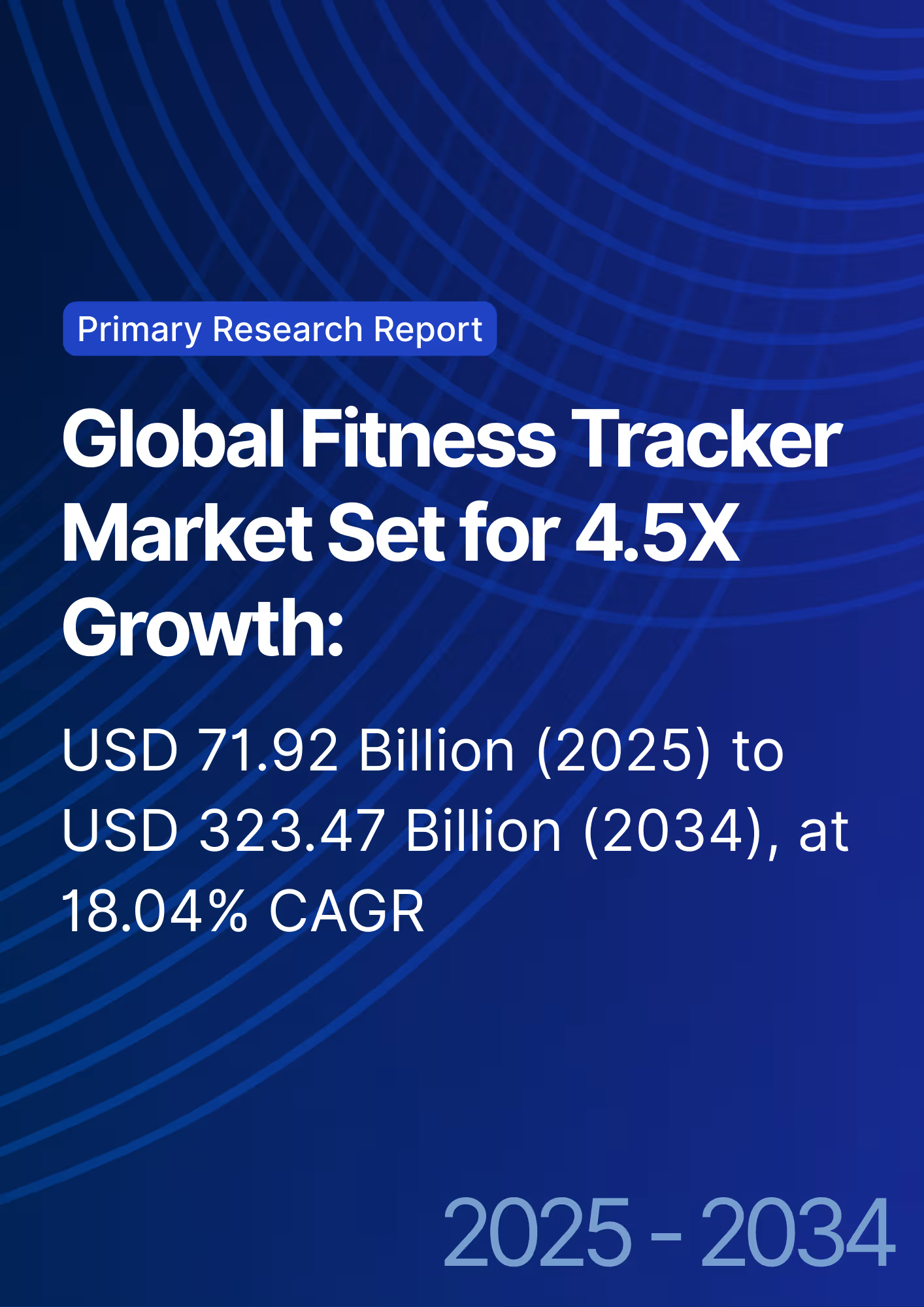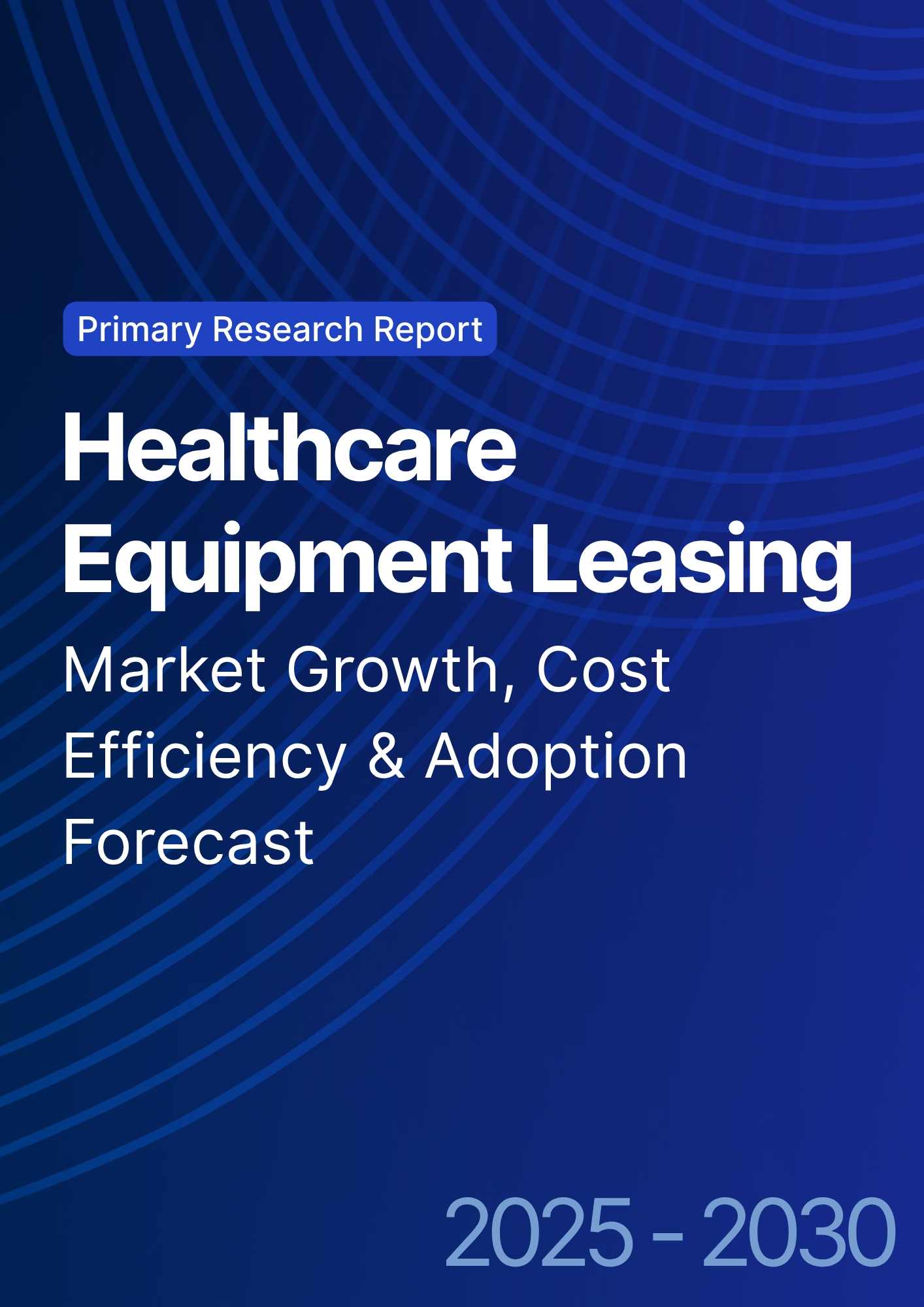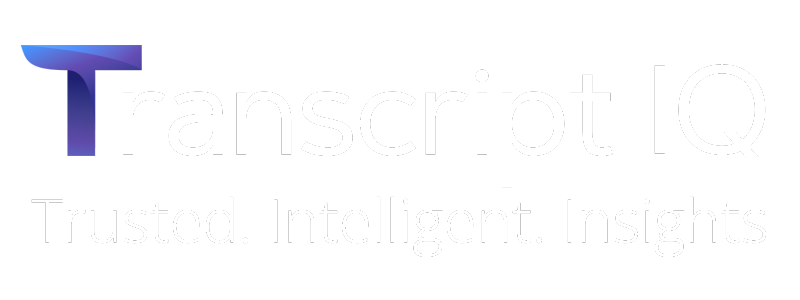

68 Circular Road, #02-01 049422, Singapore
Revenue Tower, Scbd, Jakarta 12190, Indonesia
4th Floor, Pinnacle Business Park, Andheri East, Mumbai, 400093
Cinnabar Hills, Embassy Golf Links Business Park, Bengaluru, Karnataka 560071
Connect With Us
Health Tech Venture Capital Trends: Valuations and Strategic Investment Signals
This report examines the venture capital (VC) trends in the health tech sector across the US and North America (2025–2030), focusing on valuations, investment signals, and emerging market opportunities. The health tech VC market is expected to grow from $8.3B in 2025 to $22.4B by 2030 (CAGR 21%). Key drivers include increased demand for telehealth, digital health platforms, AI-driven diagnostics, and personalized medicine. Strategic investments are shifting towards AI, patient data management, and healthcare infrastructure, with AI-led innovation making up 36% of total investments by 2030. By 2030, the health tech market will see more diversified portfolios, with fintech integration and mental health platforms receiving growing attention from investors.
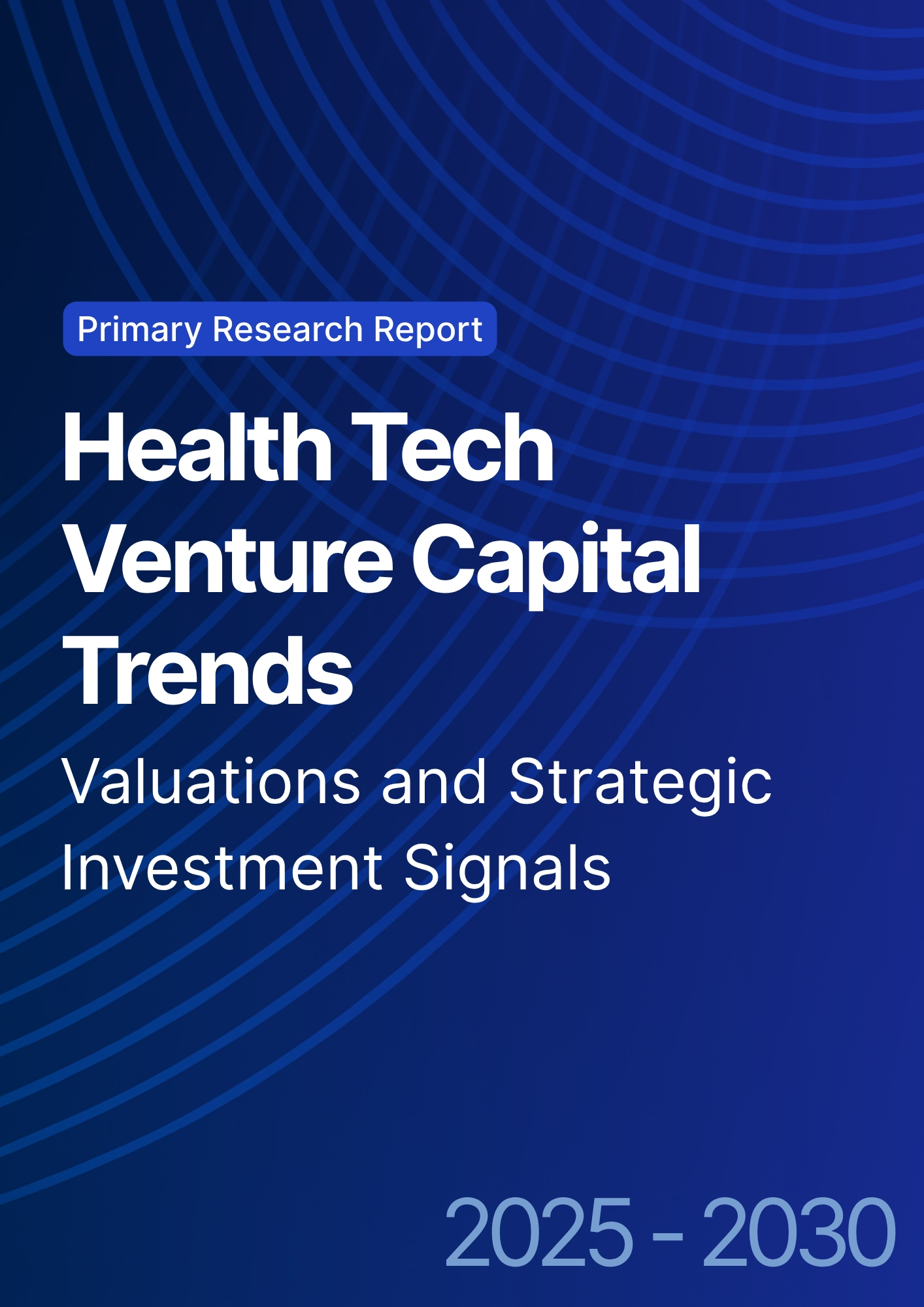
What's Covered?
Report Summary
Key Takeaways
- Health tech VC market grows $8.3B → $22.4B (CAGR 21%) by 2030.
- AI-driven health solutions capture 36% of total VC investment by 2030.
- Telemedicine investments increase by +25% annually, reaching $7.4B by 2030.
- Digital health platforms account for 28% of total health tech VC funding by 2030.
- Patient data management solutions drive $3.5B in investments by 2030.
- Mental health platforms see a 40% increase in VC funding from 2025–2030.
- Healthcare infrastructure innovations attract $4B in VC funding by 2030.
- Fintech and health tech integration accounts for 15% of investments by 2030.
- Regulatory compliance solutions for health tech increase by +18% annually.
- ROI from health tech investments expected to be 15–25% by 2030.
Key Metrics
Market Size & Share
The health tech VC market in North America is expected to grow from $8.3 billion in 2025 to $22.4 billion by 2030, with a CAGR of 21%. The market growth is driven by increasing demand for AI-powered health solutions, telemedicine, digital health platforms, and patient data management technologies. By 2030, AI-driven health solutions are expected to make up 36% of total VC investments, as healthcare providers embrace machine learning and predictive analytics to improve patient outcomes and reduce costs. Telemedicine investments will experience 25% annual growth, reaching $7.4 billion by 2030, as more virtual care solutions are adopted across North America. Digital health platforms will capture 28% of the funding, driven by the growing demand for patient management systems, health monitoring tools, and remote care services. Additionally, the mental health sector will see a 40% growth in VC funding as investors recognize the rising need for mental health care solutions. The healthcare infrastructure sector will also see substantial investment, with $4 billion expected by 2030. Fintech integration into health tech is predicted to capture 15% of market investments, particularly in payment processing for healthcare services. The overall ROI from these investments is expected to be 15–25% by 2030, driven by the adoption of innovative technologies and growing market demand.
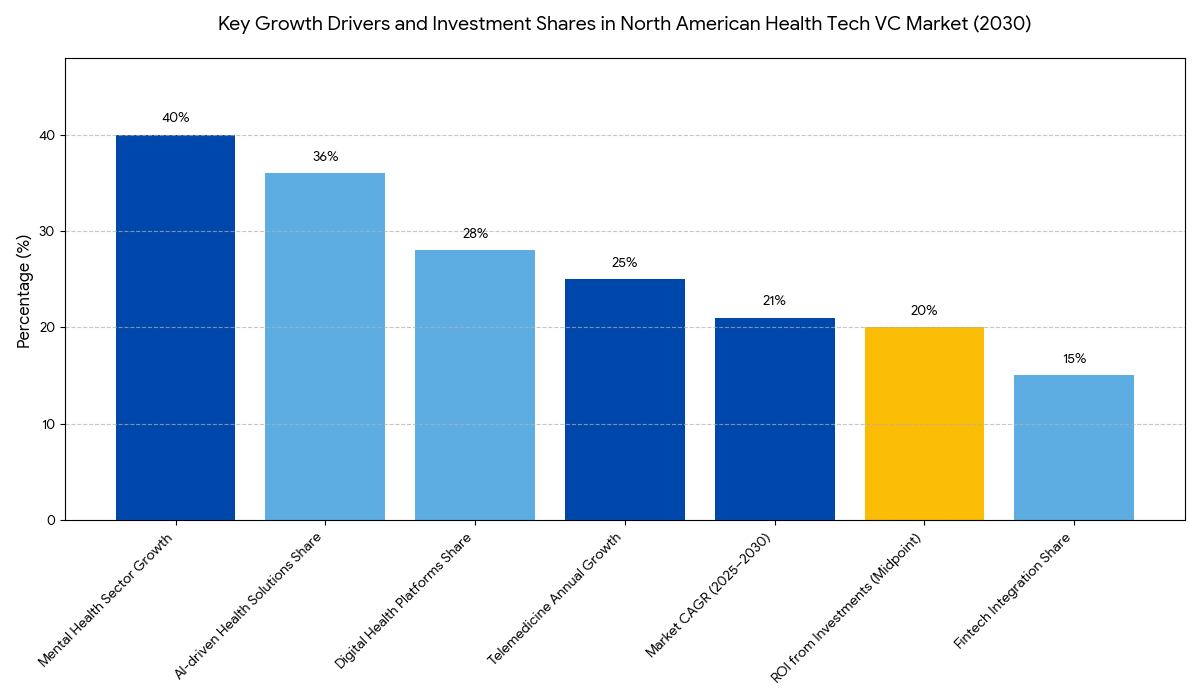
Market Analysis
The health tech venture capital market is being shaped by several key trends. AI-driven health solutions are attracting significant investment, as AI technologies like machine learning and predictive analytics are revolutionizing patient care. These solutions are expected to account for 36% of the total VC funding in health tech by 2030. The telemedicine sector will see +25% growth annually, particularly as virtual care platforms expand to serve a broader patient base. Investors are increasingly looking for scalable technologies that can address healthcare access issues, especially in remote and underserved regions. Digital health platforms that provide patient management tools, remote monitoring, and health apps will continue to grow, capturing 28% of the market. As mental health issues rise, mental health platforms will see an increase of +40% in VC funding by 2030, especially for solutions that provide AI-based diagnostics and teletherapy services. Fintech integration into health tech will also be a growing focus, particularly with the rise of payment solutions for healthcare providers. Overall, ROI on health tech VC investments is estimated to be 15–25% by 2030, driven by the increasing adoption of AI, telemedicine, and patient-centered solutions.
Trends & Insights
Key trends that will shape the health tech venture capital market from 2025–2030 include the integration of AI in healthcare, the growth of telemedicine, mental health solutions, and fintech in health tech. AI technologies will drive the largest share of VC investments, expected to account for 36% of the total market. These innovations will play a key role in transforming patient care through AI-powered diagnostics, predictive models, and automated medical solutions. Telemedicine will continue to grow rapidly, as virtual care platforms become more common, particularly with the rise in demand for at-home healthcare services. The mental health sector will see increasing investment as mental health issues become more prevalent, driving +40% growth in VC funding by 2030. Additionally, fintech integration into health tech solutions will capture 15% of the market, especially for payment solutions and billing systems for healthcare providers. Regulatory compliance will also become a major driver for health tech investments, with investors focusing on companies that are capable of meeting stringent healthcare regulations like HIPAA and GDPR. These trends highlight the shift towards digital transformation in the healthcare industry, with a strong focus on AI, telemedicine, and patient-centered solutions.
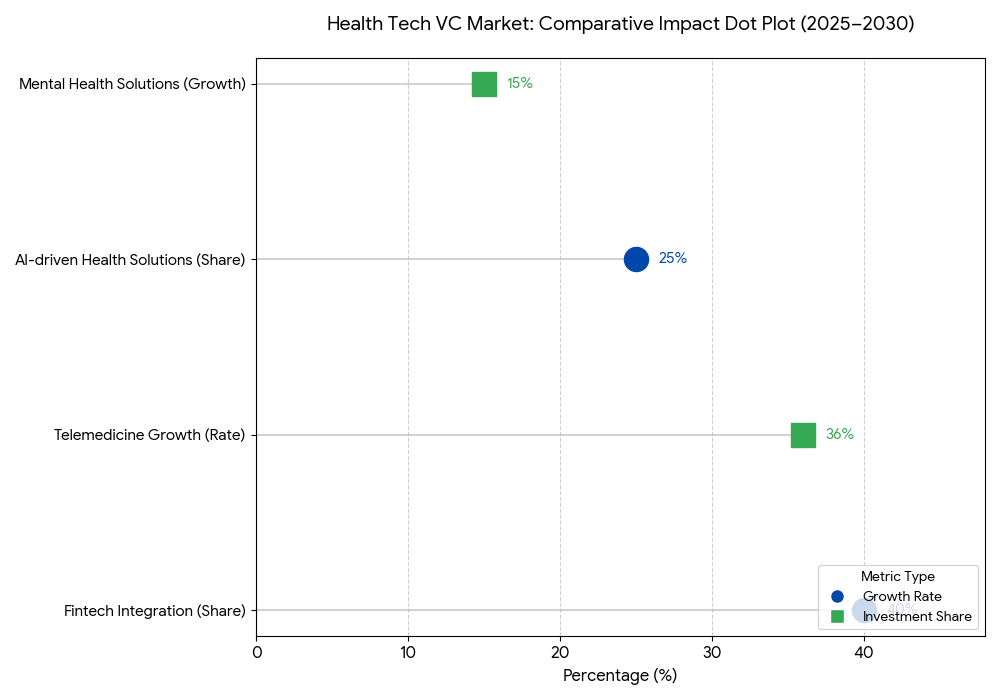
Segment Analysis
The health tech VC market is segmented into AI-driven solutions, telemedicine, digital health platforms, mental health tech, and fintech-health tech integration. By 2030, AI-driven solutions will represent the largest segment, capturing 36% of total VC investments. These technologies include AI-powered diagnostics, clinical decision support, and personalized medicine. Telemedicine will be the second-largest segment, expected to grow 25% annually, driven by increased access to virtual care. The digital health platform segment will also grow significantly, capturing 28% of the market, as demand for remote patient monitoring and health apps rises. Mental health tech will see +40% investment growth, especially in AI-based mental health platforms that provide virtual therapy and patient support systems. Fintech integration will account for 15% of VC funding, primarily focused on payment processing systems for healthcare services. By 2030, the overall market growth in the health tech space will be driven by the integration of AI, telemedicine, and digital platforms, creating new opportunities for innovation and patient-centered care.
Geography Analysis
In North America, the US will remain the dominant market, capturing ~70% of the health tech VC market share by 2030. The US market is expected to see the largest investment growth due to the increasing demand for telemedicine, AI-driven health solutions, and patient data management tools. Canada will contribute ~15% of the total market share, driven by government healthcare initiatives supporting digital health transformation and telemedicine. By 2030, Latin America and Mexico are expected to emerge as growth markets for health tech, driven by cross-border collaborations and the adoption of US-based telemedicine solutions. In Europe, the UK and Germany will remain the leaders in health tech investment, with telemedicine platforms and AI technologies being major focus areas. By 2030, Europe will contribute ~20% of the global market in health tech VC investments, primarily driven by regulatory changes and increased demand for digital healthcare solutions. EU regulations such as GDPR will also shape the health tech landscape, ensuring data privacy and fostering trust in AI-driven solutions.
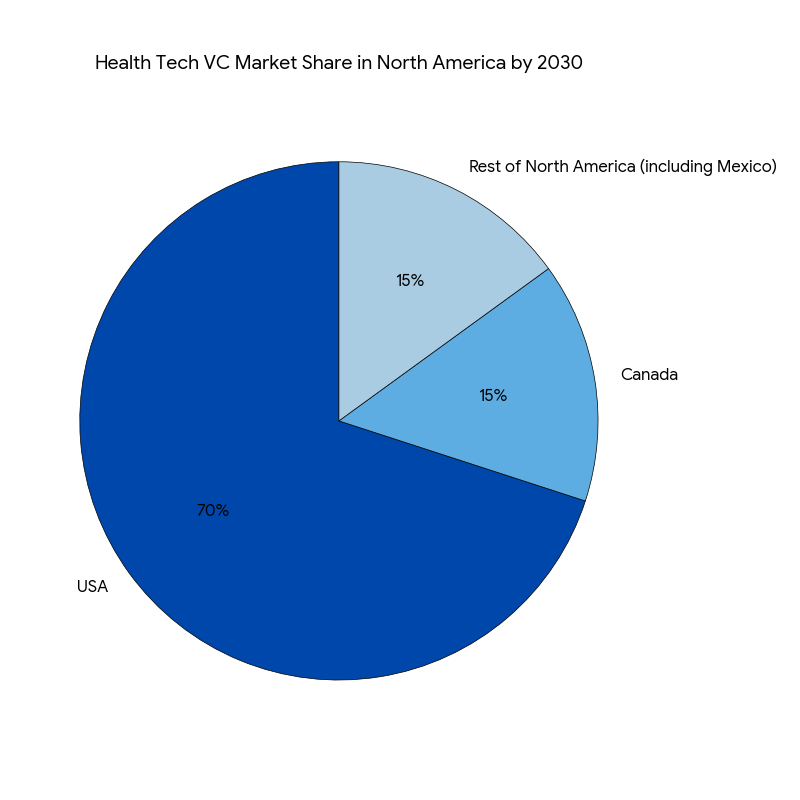
Competitive Landscape
The health tech venture capital market is competitive, with AI-powered startups and telemedicine giants leading the way. Companies such as Tempus, Babylon Health, and Livongo Health dominate the market by focusing on AI-driven diagnostics, remote care solutions, and digital health platforms. MedTech firms like Philips and GE Healthcare are investing heavily in AI-powered health tools, including patient monitoring devices and data analytics platforms. Emerging startups in mental health tech such as Headspace and Woebot Health are also gaining traction, securing VC funding for AI-based therapy platforms. The competition is heating up in fintech-health tech integration, with companies like Zocdoc and Oscar Health developing healthcare payment solutions. The insurance sector is also a key player in the market, with companies like Cigna and UnitedHealth investing in health tech startups that offer AI-driven patient engagement tools and personalized care solutions. By 2030, pricing models will shift towards performance-based investments, with venture capital firms seeking higher ROI from AI-enhanced healthcare platforms that drive improved patient outcomes and cost reductions.
Report Details
Proceed To Buy
Want a More Customized Experience?
- Request a Customized Transcript: Submit your own questions or specify changes. We’ll conduct a new call with the industry expert, covering both the original and your additional questions. You’ll receive an updated report for a small fee over the standard price.
- Request a Direct Call with the Expert: If you prefer a live conversation, we can facilitate a call between you and the expert. After the call, you’ll get the full recording, a verbatim transcript, and continued platform access to query the content and more.


68 Circular Road, #02-01 049422, Singapore
Revenue Tower, Scbd, Jakarta 12190, Indonesia
4th Floor, Pinnacle Business Park, Andheri East, Mumbai, 400093
Cinnabar Hills, Embassy Golf Links Business Park, Bengaluru, Karnataka 560071
Request Custom Transcript
Related Transcripts


68 Circular Road, #02-01 049422, Singapore
Revenue Tower, Scbd, Jakarta 12190, Indonesia
4th Floor, Pinnacle Business Park, Andheri East, Mumbai, 400093
Cinnabar Hills, Embassy Golf Links Business Park, Bengaluru, Karnataka 560071







